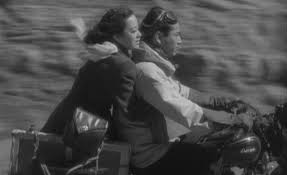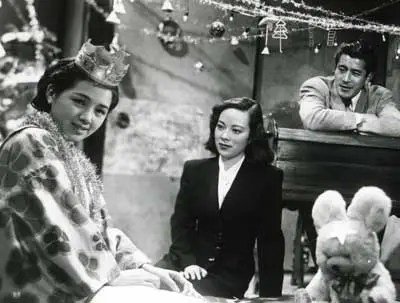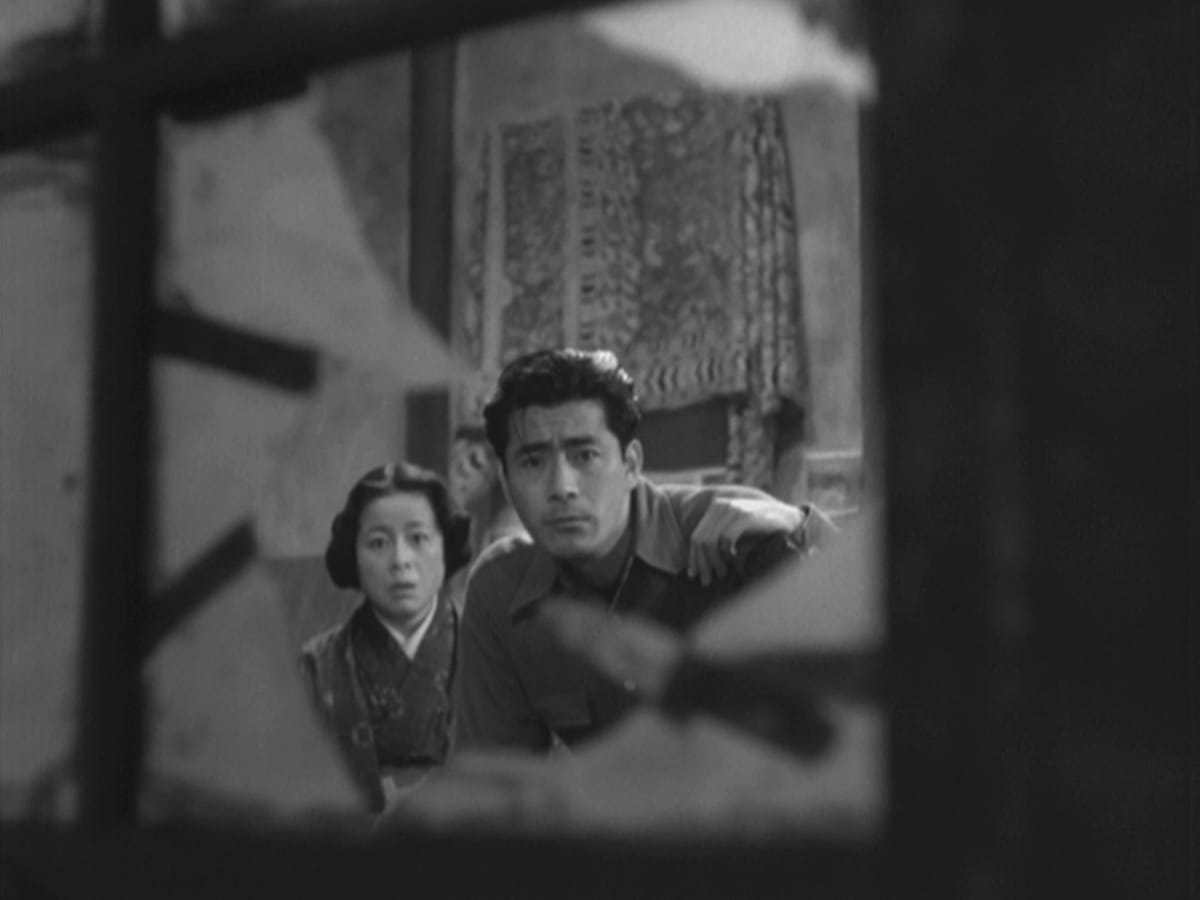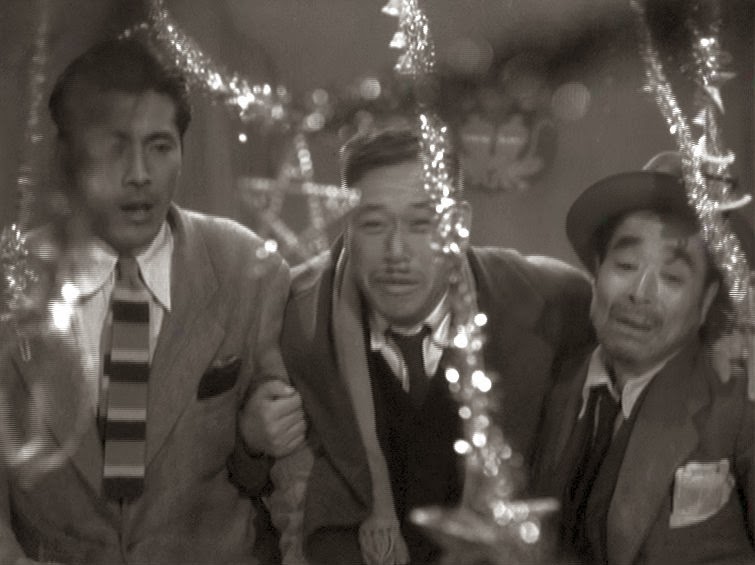




There isn’t much that would recommend “Scandal” to a cinephile who isn’t trying to finish off The Complete Works of Akira Kurosawa. It’s a sentimental, maudlin melodrama with comical flourishes, not as ambitious or epic as the director’s best work.
But the immaculate compositions — sampled above — and the crisp editing, the vivid slice of Japanese life sanpled and the depictions of post-war Japan’s rapid “Americanization” make it a fascinating artifact. And Toshiro Mifune and Takashi Shimura, two of the most important Japanese screen actors ever, star in it, with singer-actress Shirley Yamaguchi (her music was in “Crazy Rich Asians,” “House of Bamboo,” etc.) and 290 credit character actor Eitarô Ozawa, who plays the villain.
It’s not scaled to the scope of the breakthrough period pieces that made Kurosawa’s reputation. And it lacks the emotional depth of the more intimate films of this period in his career. But it’s pretty entertaining and well worth a look.
Mifune plays a dashing artist whom we meet on a mountain overlook, painting Mount Kumotori in front a few simple, happy locals. A pretty stranger (Yamaguchi) shows up, having missed her bus. He offers to give her a lift to the inn in Kaminoyu, where they both happen to be staying.
Of course he rides a motorcycle. And he’s fond of his pipe. Ichirô Aoye isn’t really famous, but he cuts quite the figure. But singer Miyako Saijo, once he realizes who she is, has paparazzi on her tail. She IS famous, and the paps would love nothing better than to snap a few candid shots.
A chaste but friendly and perhaps indiscrete visit to her room, pointing out the views from her balcony is where they’re photographed, in bathrobes.
Amour Magazine is thrilled to publish it with a ginned-up story headlined “Love on a Motorcycle.”
“Shouldn’t we check?” the reporter wonders (in Japanese with English subtitles). Naah, the editor cracks. “The picture PROVES it!”
Aoye finds himself plastered all over walls and telephone poles as Amour Mag sells out and becomes the talk of the town. When he finally motorcycles up to their office, he takes his time reading the article in front of the editor and the smirking publisher (Ozawa). Being a badass, after a suspenseful minute or three, he punches publisher Hori right in the kisser.
He’ll SUE! Well, maybe they’ll sue each other, even though lawsuits were very rare in Japan back then.
As his outrage is covered by other publications in a gossip-obsessed Tokyo, a down-on-his-luck lawyer (Shimura of “Iriku” and other Kurosawa classics) comes to express sympathy, share his “injustice” outrage, and offer to take the case.
Aoye’s favorite artist’s model (Noriko Sengoku) may see the warning signs in the slovenly legal eagle. But even a visit to the drunk’s racing-form filled dump of an office won’t dissuade Aoye once he’s met the man’s tubercular teenage daughter (Yôko Katsuragi).
“A man’s family reveals his character.”
Besides, as he tries to enlist a very-reluctant Saijo in the suit, “The important thing is that we’re in the right. How can we lose?”
Oh, let us count the ways.
The second act of “Scandal” shows us how the case is sure to unravel, how the weepy old man representing them is one big liability. And the third act is taken up with a long and very Japanese court trial.
Mifune was always a riveting screen presence. But one thing you pick up on in his early films with Kurosawa is this head scratching affectation that he brings to scene after scene, expressing befuddlement and rising fury. It’s a wonder his hair survived those years.
The patience his character shows with Trainwreck, Attorney at Law, seems far fetched. But the film has this idealism about The New Japan, a new justice system, freedom of the press pushing back for their “right” to “harass.” That’s what Aoye is idealizing and choosing to believe in.
He throws himself into entertaining the sick teen (Yamaguchi sings “Silent Night” to her in Japanese), motoring in with a Christmas tree on the motorcycle, taking the old man out drinking for New Year’s Eve (Mifune and Shimura sing “Auld Lang Syne” in Japanese).
None of it adds up to all that much, but “Scandal” is engaging and immersive, serving up bits of old culture and tourism in collision with a changing society and an early Western-style Japanese “media circus.”
And Mifune and Shimura soldier through this slight film with a hint of warmth and pathos to go with the promise of working in the masterpieces to come.
Rating: TV-14, innuendo
Cast: Toshiro Mifune, Shirley Yamaguchi,
Takashi Shimura, Yôko Katsuragi, Noriko Sengoku and Eitarô Ozawa
Credits: Directed by Akira Kurosawa, scripted by Ryûzô Kikushima and Akira Kurosawa. A Shochiku production now streaming on Tubi, Amazon, etc.
Running time: 1:45

